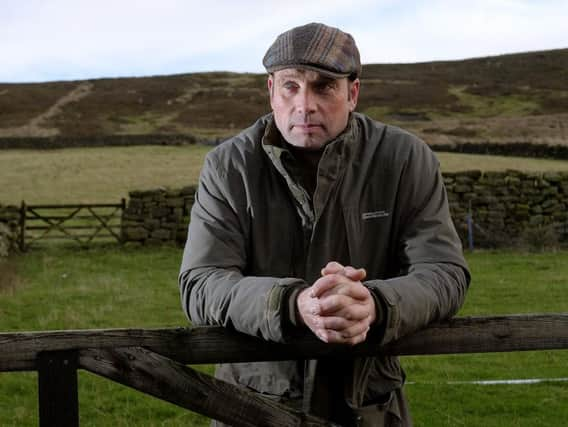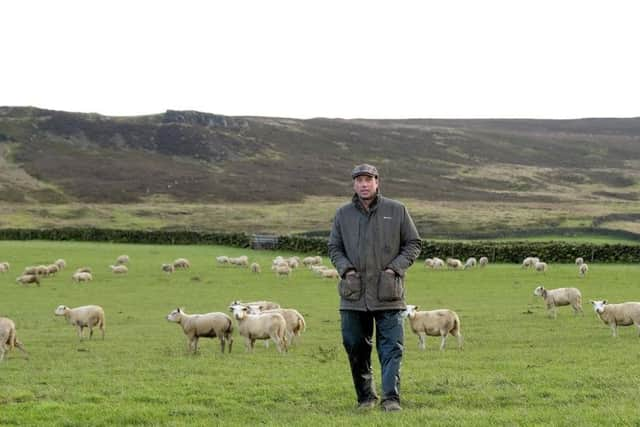Hill farmer's hopes for a 'new dawn' in farming with introduction of the Agriculture Bill


There are many sectors from massive arable farms to ‘dog and stick’ men and women.
Richard Findlay who farms up to 1,300ft in the middle of the North York Moors National Park runs a double life. In life number one, he says: “I aspire to being ‘Yorkshire’s laziest farmer’, by that I mean keeping everything simple, such as sheep that shed their own wool.”
Advertisement
Hide AdAdvertisement
Hide AdRichard runs 1,100 predominantly Easycare ewes at Quarry Farm, Westerdale and has a small flock of Beltex ewes, producing tups.


He was one of the founding members of the Seven Hill Farmers marketing group that started with just seven farmers that now has between 50-60 members and markets around 40,000 lambs a year that go into Tesco and Aldi.
This year he has lambed 100 of his ewes, crossed with the Suffolk tup, in January. It’s all about cash flow so far as Richard is concerned.
Agriculture Bill puts fresh focus on the relationship between farming and the environmentFormer rugby player and livestock farmer learning the ropes in arable“It’s part of spreading our risk. We have plenty of buildings to keep the sheep inside, to assist with early lambing. We decided if we could sell lambs over a wider selling period it could mitigate our risk.
Advertisement
Hide AdAdvertisement
Hide Ad“Our Suffolk X Easycare lambs should come on to the market at the end of April and beginning of May and hopefully catch what are traditionally the highest prices. We may increase the number of ewes we lamb in January next year to mitigate things further.
“Cash flow is probably our biggest challenge as a business. Like most hill farms I’m always glad to see the farm payment come in from the Rural Payments Agency and our stewardship payment for being in the higher-level scheme.
“The Easycare is a composite breed developed on the Isle of Anglesey using the Welsh Mountain and the Wiltshire Horn. They are both recognised hill breeds and the added advantage is they don’t need shearing as they shed their wool.
“We have a replacement flock of 300 and we’ve improved our lambing percentage from 150 per cent to 170 per cent in the past 10 years by keeping twin-born ewe lambs as replacements.
Advertisement
Hide AdAdvertisement
Hide Ad“I’m not too bothered about keeping purebreds on the hill. I recently bought a half-Cheviot tup, as I chose the Cheviot when we started with the Easycares for their hybrid vigour and want to keep replenishing it within the flock. Sheep as a species adapt well to their surroundings. I’m not really fussed what sort of X so long as it sheds its wool, as that saves on clipping.
“We have 200-plus acres of in-bye land and 1,200 acres of heather moorland on Westerdale Moor and Westerdale Common where we have to turn out 360 sheep on to the moor at the beginning of June and can go up to 720.”
Richard’s double life comes in the form of being national livestock board chairman for the NFU. It’s a million miles away from his day job in the hills tending his flock, although working on behalf of those in a similar position, as well as those who have substantially different enterprises.
Last month’s General Election cleared the way for a new Agriculture Bill released last week and what Richard hopes will lead to a new dawn for farming in the UK.
Advertisement
Hide AdAdvertisement
Hide Ad“As a country we are now much more in control of our own destiny and that is a big opportunity. The very decisive result has provided quite a bit of clarity, although there is still a chance, if negotiations fail, that we could leave without a deal, which would be catastrophic for the country generally but particularly agriculture.
“We’d be looking at tariffs and that’s something we’d want to avoid at all costs.
“This government realises the industry can’t change overnight and that it can’t do what happened in New Zealand, where subsidy was just cut overnight, and so, already after the election, we’ve had a commitment from this government to the same level of funding we’ve had from the EU for the lifetime of this parliament, when we leave. That hopefully gives us five years of maintained payments.”
Those payments will come not through the same systems as previously after the UK leaves the EU but through what it appears will be known as the Environmental Land Management Scheme in what the government refers to as ‘public money for public goods’.
Advertisement
Hide AdAdvertisement
Hide Ad“Where we are going to see change,” says Richard. “Is instead of wanting support to keep beef and sheep we need to start asking for it to create biodiversity in such as improving water quality and soil quality.
“There’s a commitment to review every five years our self-sufficiency as a country. Food has been raised in the profile making a greater recognition that food is an important part of the Agriculture Bill, that’s one thing that has changed from when it was initially published when there was hardly any mention, and that’s good for farmers.”
Competing on a level playing field with food imports has long been one of the NFU’s main bones of contention whereby what has been grown elsewhere has not been subject to the same regulation as in the UK. Richard is happy to see the government’s reaction through the bill.
“We can’t compete on price, so we have to offer better welfare standards, better traceability, carbon footprinting and better quality. I think we can do that.
Advertisement
Hide AdAdvertisement
Hide Ad“This government is committed to the producer getting a fair share proportionate to the risk being taken, allowing greater fairness in the supply chain.
“We know where we are heading, we just need the support of government and the public – it looks like we are getting it with the Agriculture Bill.
“Up here in Westerdale, with our severely disadvantaged status, we will become habitat managers, big scale gardeners, but instead of lawnmowers we have sheep. That’s how we will make it work.”